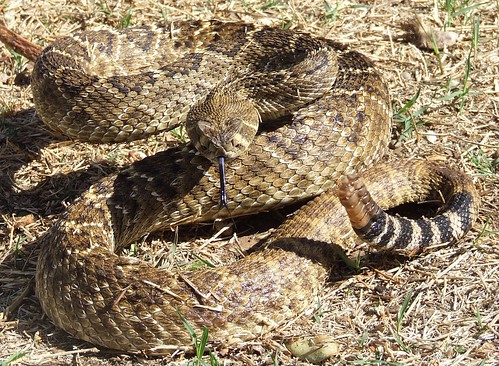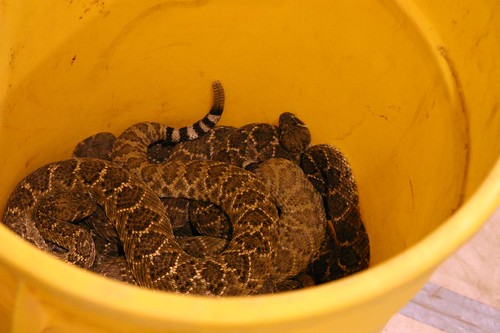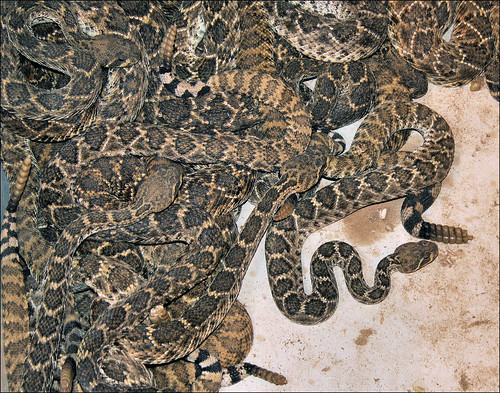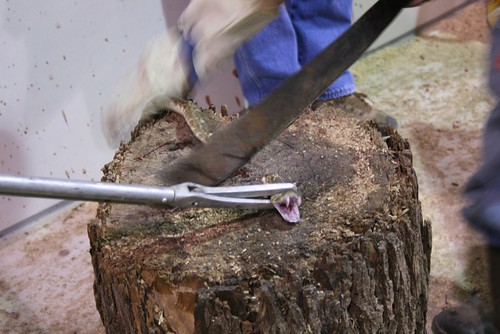
Stop the Slaughter of Wildlife for Entertainment
- by: Michael Erickson
- recipient: Mayor of Sweetwater, Texas; Sweetwater, Texas, Chamber of Commerce










Dear Mayor of Stweetwater, Texas, and Sweetwater Chamber of Commerce:
Rattlesnake roundups are cruel and ecologically damaging events that have taken place in many parts of the United States since the late 1920s. Every year, in the states of Texas, Oklahoma, Kansas, New Mexico, Pennsylvania, Alabama and Georgia, thousands of rattlesnakes are captured and slaughtered or used in competitive events in ways that violate the most basic principles of wildlife management and humane living. Though they are often promoted as fundraising events for local civic causes, rattlesnake roundups primarily benefit their organizers and corporate sponsors.
Organizers claim that roundups help rid range and timberlands of a threat to humans and livestock. But this rationale has been amply refuted by physicians, biologists and veterinarians who have conducted studies showing that the number of livestock deaths from rattlesnake bites is negligible, and that, instead of ridding humans of a dangerous pest, rattlesnake roundups actually increase the number of humans bitten.
Rattlesnake roundups promote unhealthy, and potentially dangerous, attitudes toward wildlife. They encourage overexploitation of wildlife, condone cruelty as acceptable behavior, and endorse the attitude that the capture, abuse, and slaughter of potentially dangerous animals are ways to demonstrate courage or skill. Such activities are more accurately described as reckless personal endangerment at the expense of the animal victims, a healthy ecosystem, and the public good.
A recent year-long, nationwide investigation into rattlesnake roundups revealed that:
- Rattlesnake roundups are grossly inhumane. Snakes are driven from resting areas with toxic chemicals including gasoline, are held for weeks or months without food or water in crowded and unsanitary conditions, are roughly handled during roundups (including kicking, stomping, and whipping), are often skinned alive or have their mouths sewn shut, and are killed using methods that are inappropriate for reptiles.
- Rattlesnake roundups are environmentally destructive. Rattlesnake populations are being harmed by collections for roundups. The toxic chemicals used to collect snakes are destructive to all wildlife that come in contact with them. Burrows used by snakes and other wildlife (including federally protected species) are destroyed during collection, and snakes transported long distances to roundups have been released and have become established in areas where they did not previously exist.
- Rattlesnake roundups pose a public health hazard. Roundups unnecessarily bring members of the public in close contact with venomous reptiles and encourage reckless behavior around rattlesnakes. Rattlesnake meat sold at roundups is from snakes killed under unsanitary conditions, so it may contain harmful bacteria and parasites as well as residues from the toxic chemicals used during collection. Those same toxic chemicals can also contaminate groundwater used by humans, livestock and wildlife. Finally, communities in which roundups take place must bear the costs of medical treatment for any bites that occur during the roundup, and such bites reduce the local antivenin supply.
Furthermore, there is a demonstrated link between violence and cruelty to animals and violence toward humans. The FBI and other law enforcement agencies, when discussing serious violence to humans, often note that a history of violence to animals is a characteristic in the perpetrator. It is difficult to conceive of such unmitigated and unjustified cruelty as that exhibited in rattlesnake roundups. Moreover, the pervasive involvement of children as spectators or participants in the rattlesnake roundups provides an even greater rationale for serious concern over the effects of these events.
In today's world, there can be no justification for the continuation of these brutal, inhumane, and counter-educational events. We, the undersigned urge you to take immediate and responsible action to eliminate the rattlesnake roundup in Sweetwater, Texas.
You may visit this web page: www.hsus.org/wildlife/issues_facing_wildlife/rattlesnake_roundups/
harmful_effects_of_rattlesnake_roundups.html to learn even more about the harmful effects of rattlesnake roundups.
Sincerely,
The Undersigned










We, the undersigned were horrified to learn that Sweetwater, Texas hols an annual rattlesnake roundup event.
Rattlesnake roundups are cruel and ecologically damaging events that have taken place in many parts of the United States since the late 1920s. Every year, in the states of Texas, Oklahoma, Kansas, New Mexico, Pennsylvania, Alabama and Georgia, thousands of rattlesnakes are captured and slaughtered or used in competitive events in ways that violate the most basic principles of wildlife management and humane living. Though they are often promoted as fundraising events for local civic causes, rattlesnake roundups primarily benefit their organizers and corporate sponsors.
Organizers claim that roundups help rid range and timberlands of a threat to humans and livestock. But this rationale has been amply refuted by physicians, biologists and veterinarians who have conducted studies showing that the number of livestock deaths from rattlesnake bites is negligible, and that, instead of ridding humans of a dangerous pest, rattlesnake roundups actually increase the number of humans bitten.
Rattlesnake roundups promote unhealthy, and potentially dangerous, attitudes toward wildlife. They encourage overexploitation of wildlife, condone cruelty as acceptable behavior, and endorse the attitude that the capture, abuse, and slaughter of potentially dangerous animals are ways to demonstrate courage or skill. Such activities are more accurately described as reckless personal endangerment at the expense of the animal victims, a healthy ecosystem, and the public good.
A recent year-long, nationwide investigation into rattlesnake roundups revealed that:
- Rattlesnake roundups are grossly inhumane. Snakes are driven from resting areas with toxic chemicals including gasoline, are held for weeks or months without food or water in crowded and unsanitary conditions, are roughly handled during round-ups (including kicking, stomping, and whipping), are often skinned alive or have their mouths sewn shut, and are killed using methods that are inappropriate for reptiles.
- Rattlesnake roundups are environmentally destructive. Rattlesnake populations are being harmed by collections for roundups. The toxic chemicals used to collect snakes are destructive to all wildlife that come in contact with them. Burrows used by snakes and other wildlife (including federally protected species) are destroyed during collection, and snakes transported long distances to round-ups have been released and have become established in areas where they did not previously exist.
- Rattlesnake roundups pose a public health hazard. Roundups unnecessarily bring members of the public in close contact with venomous reptiles and encourage reckless behavior around rattlesnakes. Rattlesnake meat sold at roundups is from snakes killed under unsanitary conditions, so it may contain harmful bacteria and parasites as well as residues from the toxic chemicals used during collection. Those same toxic chemicals can also contaminate groundwater used by humans, livestock and wildlife. Finally, communities in which roundups take place must bear the costs of medical treatment for any bites that occur during the roundup, and such bites reduce the local antivenin supply.
Furthermore, there is a demonstrated link between violence and cruelty to animals and violence toward humans. The FBI and other law enforcement agencies, when discussing serious violence to humans, often note that a history of violence to animals is a characteristic in the perpetrator. It is difficult to conceive of such unmitigated and unjustified cruelty as that exhibited in rattlesnake roundups. Moreover, the pervasive involvement of children as spectators or participants in the rattlesnake roundups provides an even greater rationale for serious concern over the effects of these events.
Communities and charities can transform rattlesnake roundups into events that make money for organizers, sponsors and charities without harming snakes, humans or the environment. A reform movement in San Antonio, Florida, progressively transformed its rattlesnake roundup event into a rattlesnake festival. The shift started with compassionate thoughts and concerns for the welfare of the animals used in the event and the environmental message imparted by it. Soon collecting snakes was discontinued, as was collecting and racing gopher tortoises. The new event races mechanical gopher tortoises, which are guided down a track with a rope and pulley system. This change in focus has done nothing to reduce the amount of money earned by the festival. The popular, two-day event held in 1998 brought in more than $30,000. Festival organizers have attracted a variety of activities, and they prohibit the sale of wildlife products.
In today's world, there can be no justification for the continuation of these brutal, inhumane, and counter-educational events. We, the undersigned urge you to take immediate and responsible action to eliminate the rattlesnake roundup in Sweetwater, Texas.
You may visit this web page: www.hsus.org/wildlife/issues_facing_wildlife/rattlesnake_roundups/
harmful_effects_of_rattlesnake_roundups.html to learn even more about the harmful effects of rattlesnake roundups.
We greatly thank you for taking the time to read this letter, and we deeply hope that you will examine our petition carefully and give it the utmost consideration.
By signing, you accept Care2's Terms of Service.
You can unsub at any time here.
Having problems signing this? Let us know.